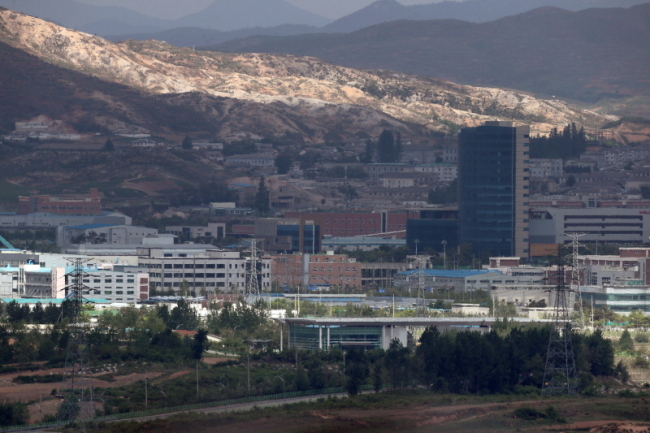South Korean business operators of the now-shuttered joint industrial complex in North Korea’s border city of Kaesong are stuck in a limbo.
Amid North Korea’s escalating military provocations and ensuing tougher international sanctions, hopes for a resumption of business have been dashed. However, the South Korean government is late in processing compensation for the business owners, in spite of the urgency that envelopes these firms.
“Our main frustration comes from the current situation where the government’s delayed response keeps us from making solid decisions with our businesses,” Shin Han-yong, who heads an association of Kaesong industrial park’s tenant companies, told The Korea Herald.
“The presidential secretariat (which overlooks the compensation process) has been ‘talking’ about this for nearly a month now. Overall, the situation seems extremely vague and it really keeps us on edge,” he said.
Shin’s Corporate Association of Kaesong Industrial Complex represents the entire 123 Kaesong tenant companies, which were once an embodiment of the South’s “sunshine” engagement policy toward the communist regime.
However, Seoul’s decision to evacuate the complex, which closely followed North Korea’s fourth nuclear test in January 2016, left many of the businessmen jobless and debt-ridden.
“We continue to hear rumors of our properties in Kaesong allegedly being stolen by North Korea,” said Lee Jong-duk, CEO of Young Inner Foam, a textile manufacturer, with evident frustration in his voice.
Like other tenants, Lee had to leave almost everything behind in Kaesong industrial park, when the abrupt eviction order arrived: factory equipment, raw materials, food, vehicles and other basic supplies, as well as products all set for shipment.
“After we abandoned the industrial park on an extremely short notice last year, we haven’t been able to go back -- it scarred our businesses and lives,” he said.
His concerns are in line with the Voice of America report on Aug. 21 which found that about 100 South Korean vehicles in Kaesong had mysteriously disappeared in June. A secured satellite image showed the vehicles, which had been untouched as of the end of 2016, were gone, indicating North Korea had moved them elsewhere.
Lee and other tenant businessmen wanted to visit the abandoned industrial zone to recover some of their assets, but were denied permission as inter-Korean tensions increased.
“Frankly, I personally got the impression that the government didn’t want us to talk about the visitation rights (to Kaesong),” Lee added.
Kaesong industrial park housed mostly small- and medium-sized manufacturers of shoes and clothing that sought to tap cheap labor in the North.
According to local reports, the shutdown dealt a devastating blow. Some 32 out of 51 firms that depended entirely on production at Kaesong had to re-establish factories and businesses in Southeast Asia, while eight had to hire contract manufacturers, as of 2017. The rest are believed to be technically defunct.
Instead of offering a solid promise for the reopening, the previous Park Geun-hye administration, which decided on the withdrawal, handed a 501.7 billion won ($442.9 million) state fund to the Kaesong firms last year which aims to cover about 63.8 percent of an estimated total loss of 780 billion won.
But the association claims the amount is insufficient, saying it does not cover the losses in Kaesong nor the total investment in re-establishing new facilities.
The Unification Ministry, under the new Moon Jae-in administration, vowed to make additional compensation in July, but specific guidelines including an exact figure and a deadline were not revealed.
Unification Ministry spokesperson Baik Tae-hyun said Wednesday that they are currently working on it in cooperation with the Office for Government Policy Coordination.
“Although we can’t confirm anything at the moment (because of the issue’s sensitivity), we have been consistently talking with the Kaesong firms to bring about a long-term solution,” a ministry official told The Korea Herald.
“We believe Kaesong industrial park is part of the function that drives toward a peaceful reunification.”
The official added there are no specific updates to the compensation guidelines yet, following the latest adoption of UNSC sanctions.
“Our businesses within the shuttered complex are worth more than the financial compensation offered to us by the government,” Lee said.
“Kaesong industrial park holds the advantage of smoother communication, domestic manufacturing, and low distribution cost -- it was a very rewarding business in many ways.”
Before taking office, it was Moon’s goal to revive stalled inter-Korean economic projects and reopen and further develop the Kaesong industrial park, as he aims to carry on the legacy of the previous liberal administrations’ sunshine policy.
Moon’s vision, however, has been heavily burdened by Pyongyang’s refusal to abandon its nuclear and missile development. Military tensions have dramatically risen on the Korean Peninsula as the North accelerated its push to develop a long-range missile and nuclear warhead capable of striking the US mainland.
By Jung Min-kyung (
mkjung@heraldcorp.com)








